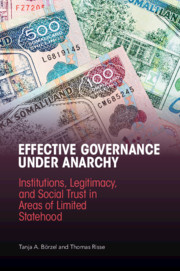 Effective Governance Under Anarchy
Effective Governance Under Anarchy from Part II - Governance in Areas of Limited Statehood: Empirical Evidence
Published online by Cambridge University Press: 09 April 2021
Chapter 7 deals with welfare governance concerning health, education, food security, and environmental protection in areas of limited statehood. The provision of collective goods and services with regard to welfare is possible “under anarchy” and under rather adverse conditions of civil war. The chapter covers a wide variety of actors – from IOs and foreign donors to (multinational) companies, multi-stakeholder partnerships, (I)NGOs, violent non-state actors, and “traditional” authorities. We find that most governors are able to provide effective governance services. Recent studies demonstrate that foreign aid improves local conditions, thereby contributing to increased state legitimacy. The contributions of business and VNSA to effective welfare governance is more circumscribed. Business as governors will step in as subsidiary service providers as long as nobody else is providing governance. As to VNSA, legitimacy needs lead them to provide effective welfare governance. However, the circle from effective governance to output legitimacy is likely to be disrupted by their opponents, e.g. by state actors fighting them. Effective welfare governance depends on two scope conditions: the absence of large-scale violence and at least some degree of public security, on the one hand, and a minimum infrastructure (such as roads and electricity), on the other.
To save this book to your Kindle, first ensure [email protected] is added to your Approved Personal Document E-mail List under your Personal Document Settings on the Manage Your Content and Devices page of your Amazon account. Then enter the ‘name’ part of your Kindle email address below. Find out more about saving to your Kindle.
Note you can select to save to either the @free.kindle.com or @kindle.com variations. ‘@free.kindle.com’ emails are free but can only be saved to your device when it is connected to wi-fi. ‘@kindle.com’ emails can be delivered even when you are not connected to wi-fi, but note that service fees apply.
Find out more about the Kindle Personal Document Service.
To save content items to your account, please confirm that you agree to abide by our usage policies. If this is the first time you use this feature, you will be asked to authorise Cambridge Core to connect with your account. Find out more about saving content to Dropbox.
To save content items to your account, please confirm that you agree to abide by our usage policies. If this is the first time you use this feature, you will be asked to authorise Cambridge Core to connect with your account. Find out more about saving content to Google Drive.